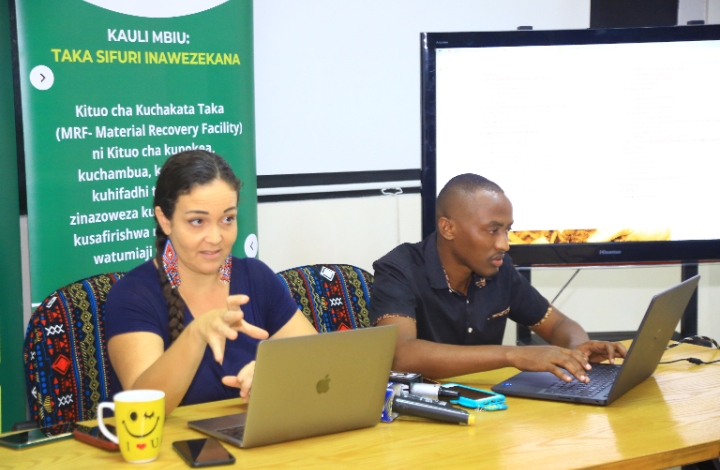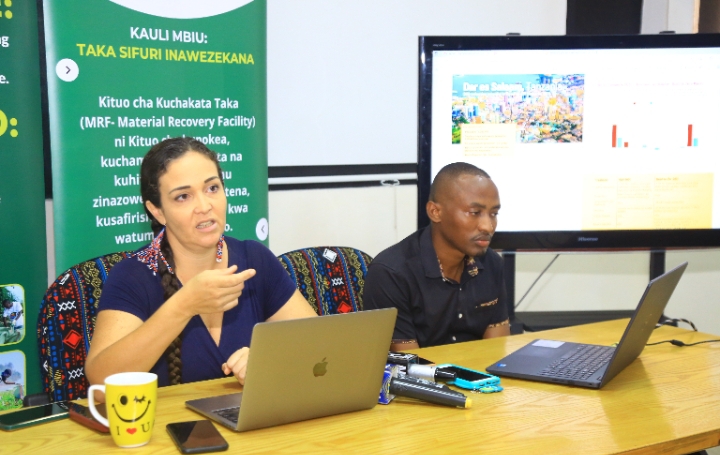

● Zero waste management can create over 18,000 jobs in the city
● Globally, better waste management could cut total emissions by 84% (1.4 bn tonnes)
and significantly reduce emissions in other sectors
● Eyes on Africa as COP27 host Egypt plans to launch 50 by 2050 Initiative
The introduction of ‘zero waste’ systems in cities around the world would be one of the quickest
and most affordable ways to reduce global heating and stay below 1.5°C of warming, according
to a new report released by Global Alliance for Incinerator Alternatives (GAIA).
The report found that through zero waste strategies, by 2030 Dar es Salaam, Tanzania could
achieve 65% greenhouse gas reductions from the waste sector.
Ana Lê Rocha, Executive Director of Tanzania–based organisation Nipe Fagio, stated, “Zero
waste in Dar es Salaam provides an opportunity to address historical social inequalities, visible
in the fact that most low–income communities in the city lack waste management services and
struggle with the health and economic impacts of waste pollution. Through a zero waste
approach, vulnerable groups– like women, youth, informal waste collectors and indigenous
populations– are included in waste management solutions, creating positive systemic change
in the waste sector that will build the foundation for a socially–just and climate resilient city.”
This comes as Egypt prepares to host the 2022 United Nations Climate Change Conference
(COP 27) in November, where waste will be one of the key climate agenda items for the African
continent–Egypt plans to put forward the 50 by 2050 Initiative, aimed at treating and recycling
50% of waste produced in Africa by 2050, an unprecedented and high–ambition effort.
“On a systemic level, Africa has a high potential to make strides towards a zero waste world due
to the high percentage of organics, progressive legislation on plastic and the presence of
waste pickers in cities across the continent. With enabling factors, like separation of waste at
source, separate management of organic waste, integration of waste pickers and better
enforcement of existing legislation on plastic, Africa can become a region that demonstrates
the effective implementation of zero waste systems,” stated Niven Reddy, GAIA’s Africa
Regional Coordinator.
GAIA’s report modelled potential emissions reductions from eight cities around the world. They
found that on average, these cities could cut waste sector emissions by almost 84% by
introducing better waste management policies such as waste separation, recycling, and
composting, cutting total emissions from the waste sector by more than 1.4 billion tonnes,
equivalent to the annual emissions of 300 million cars.
But this figure underestimates the potential impact of waste management reforms. At least
70% of global emissions come from the manufacture, transport, use and disposal of goods, and
a focus on waste reduction could significantly reduce the emissions in these sectors too.
According to Egyptian Minister of Environment Yasmine Fouad, Africa generates around 250
million tons of waste annually, and by the year 2050, the amount of waste is expected to
quadruple. Only 10 percent of the waste generated from Africa is currently recycled. However,
Africa leads the world on single–use plastic bans, with 34 countries having a ban or levy in
place.
GAIA’s report also maps out how zero waste systems could help cities adapt to the escalating
climate crisis, preventing both flooding and droughts, strengthening soil and agriculture, and
reducing disease transmission, all of which of high priority to African nations, who are
especially vulnerable to climate–related environmental stressors.
Zero waste is also shown to generate employment opportunities;a previous study found that if
Dar es Salaam were to recover 80% of recyclable and organic material in its waste stream, the
city could create over over 18,000 new jobs.
“Previous climate talks have largely overlooked the potential of reforms to the waste sector,
particularly for reducing methane, which over 100 countries have now pledged to do. Zero
waste strategies are the easiest way to rapidly and cheaply bring down emissions, while
building climate resilience, creating jobs, and promoting thriving local economies,” stated co–
author Mariel Vilella, Director of GAIA’s Global Climate Program.
“As we prepare for another round of UN climate negotiations, we have a unique opportunity to
put waste firmly on the agenda. Without concrete commitment from global leaders to zero
waste, we will not be able to meet the 1.5° C climate target.”
In order to keep global warming below 1.5°C, as set out in the Paris Agreement, and prevent
catastrophic climate change, GAIA is urging global leaders to take urgent and bold action on
zero waste by:
● Incorporating zero waste goals and policies into climate mitigation and adaptation
plans.
● Prioritising food waste prevention and single–use plastic ban.
● Instituting separate collection and treatment of organic waste.
● Enabling cooperatives to service households with waste collection with segregation at
source.
● Investing in waste management systems, recycling, and composting capacity.
● Establishing institutional frameworks and financial incentives for zero waste including
regulations, educational and outreach programs, and subsidies to recycling and
composting.
Janez Potočnik, Co–Chair of the International Resource Panel of the UN Environment
Programme, former European Commissioner for the Environment states: “This report
demonstrates the huge importance of aligning our waste systems with climate goals. It shows
how cities are already working to eliminate greenhouse gas emissions from waste while
building climate resilience and creating livelihoods. It highlights the absolute necessity of
reducing root sources of waste through changing our production and consumption patterns –
using all the tools at our disposal to achieve the deep emissions reductions we need.”




